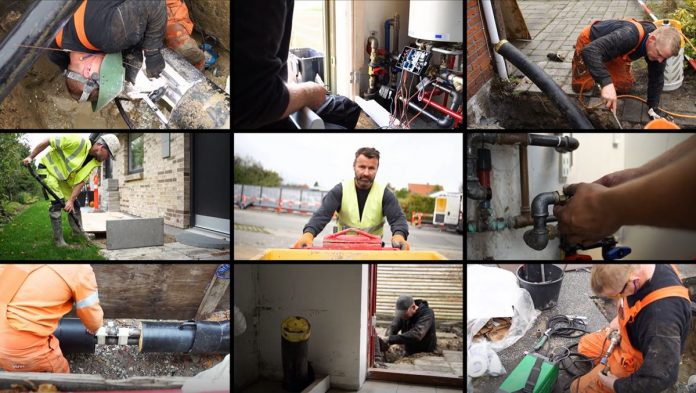Here, Rie Krabsen and Erik Christiansen of EBO Consult continue to disclose the ins and out of district heating, in particular, discussing operation and maintenance
In our article published in the July edition of Open Access Government, we described the implementation process of a district heating project in a residential area. In this follow-up piece, we will focus on the operation and maintenance process.
Asset Management
Operation and maintenance are basic elements of asset management. The way you operate and maintain the district heating system is crucial for well-organised asset management.
Expertise among the employees and surveillance tools are also important values for the day-to-day operation. A system regulation and surveillance program enable a constant overview of the distribution grid. The program keeps an eye on the grid, and it sends alarms to employees whenever there is something wrong with the pressure or temperatures. In that way, employees can react quickly to errors, which in the end ensures high security of heat supply.
EBO Consult has developed and implemented an operation strategy where all tasks are described in detail (e.g. manhours and single tasks) in an operation plan for a year. Every day the operational staff members receive calendar reminds about “today’s tasks” and they know exactly what to do and how to do, since every task is described in detail.
The operation strategy focuses on:
- Qualified service and how to do it.
- Proactive initiatives to secure further operation of the system.
- Staff members’ competences and behaviour.
- Development of customer relations and evaluation of employees’ performance.
- Communication among staff members and towards customers.
In district heating cooperatives it is experienced that customers with a high-energy consumption make agreements with the district heating cooperative to organise and administer the surveillance of the customers internal heat distribution. It is considered as a help to the single customer and the caretaker of the buildings and makes it possible for the district heating cooperative to optimise the flow in the overall heating system. Thus, heat losses minimise and return temperatures lower.
Furthermore, it is the experience that customers with many internal heat meters make agreements with the district heating cooperative about optimisation of the heat meters, where heat meters are directly controlled and surveyed by the district heating staff members. Especially housing associations are looking for optimisation of their internal heat system, and they are seeking assistance from the district heating cooperative. The result is mainly energy savings which lower the tenants’ heat invoices and an optimized heating system.
Beside operation, there is maintenance. Maintenance is key to have a distribution grid that works. If there is a leek, it is important that the valves can close. It is also important that the emergency heat production facility works whenever you need it. Therefore, a major part of running a distribution grid is maintenance.
EBO Consult has developed a specific maintenance program where life span of installations, installation costs and energy savings by exchanging, e.g. pipes, is integrated. All figures are based on long time experiences including construction works. You can actually choose different parameters in your selection of maintenance wishes. For the board of directors in district heating entities, it is a particularly important tool to economise the lifetime operation of the heating system, and it is fundamental for the implementation of a long-term strategy for the entire system.
Customer Service
What is also important when considering operation and maintenance is service. You have installed a new district heating unit – the question is are the consumers on their own after the installation or do you offer services that help them run the unit in the most efficient way?
We help the consumers by offering a technical service for free. The service is a check of the consumers heating installations every second year:
The first check is of their district heating unit and a thorough energy analysis of their houses, e.g. how the consumer can save energy in their house. After the check, the consumer receives an energy report of their house. In the report, the consumer is informed on whether their heating consumption is below or above the average consumption and it entails guidelines for what the consumer can do to optimise the energy efficiency of their house. This type of check is repeated every sixth year.
Two years after the first check, a maintenance check of the district heating unit is performed to adjust the unit in the most energy efficient and energy saving way. This type of check happens every second year.
When multiple consumers accept the service, it follows that the cooling in the whole district heating system improves, which ultimately benefits the consumers. It is due to the fact that the distribution company buys heat from the transmission company. The transmission company needs cold water to cool the electricity turbines in a CHP plant. Therefore, the transmission company has implemented a cooling tariff on the return water from the district heating system. One heating degree costs €26.889. It follows that the cooler the return water is, the less the distribution company has to pay in cooling tariff. If the cooling in the whole district heating system is improved, it, therefore, reduces the production costs, which ultimately decreases the consumer’s heating bill.
The service was nominated as one of the best practices to encourage and promote energy savings in the European project, REScoop PLUS.
Please note: This is a commercial profile












I agree! Your furnace uses air filters, and it’s important to change those filters every so often. When you continuously use the same filter, dust and debris will build up and eventually make their way into the air throughout your home.